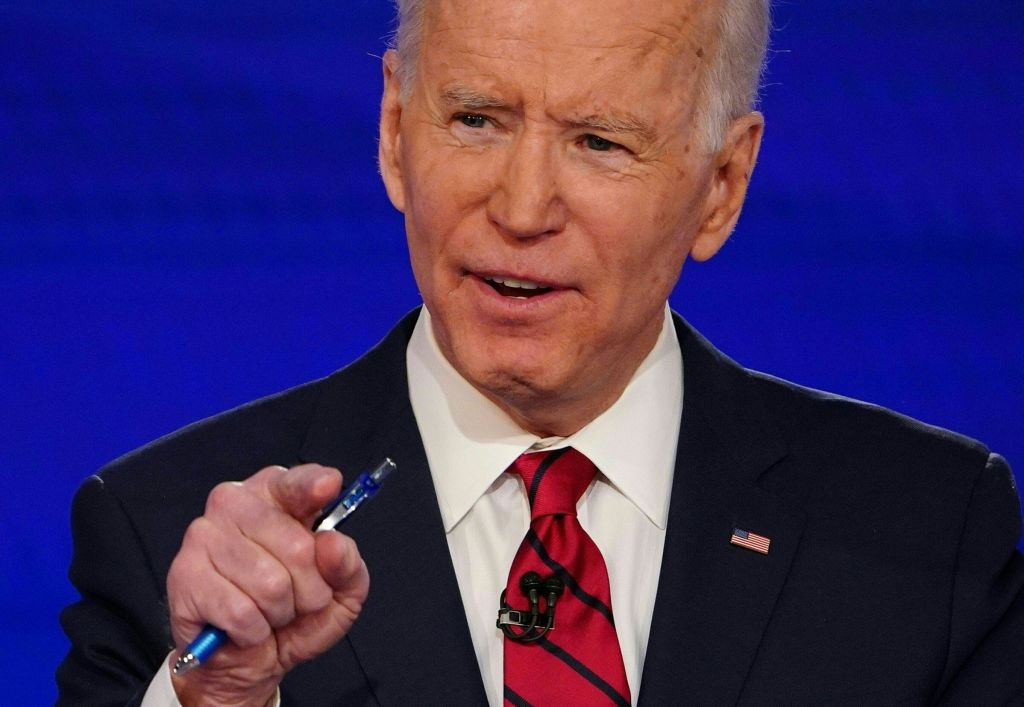What does a leading U.S. presidential candidate do when a deadly and highly contagious virus is spreading throughout the mainland United States and hogging all of the news coverage? Well, build an in-home studio in your basement, of course.
Joe Biden, the presumptive Democratic presidential nominee, is confronting a conundrum most candidates who run for high office don’t have to deal with. In normal times, candidates lose media coverage when they tumble in the polls, run out of money, or fail to excite voters (and reporters) on the stump. That’s an unfortunate part of the business, but it’s something candidates and their advisers anticipate and even control. If a candidate has money to slosh around, he can air more commercials to keep his face in the minds of voters. If a candidate is short of cash, he can still change the media dynamic by attacking the rest of the field or putting up a mesmerising debate performance.
Unfortunately for Biden, we aren’t living in normal times. The coronavirus is sucking up all of the media’s oxygen, with entire prime-time shows devoted exclusively to the pandemic on a continuous loop over a span of 24 hours. There is literally nothing else America is talking about at the moment.
The problem is even worse for Biden because he is preparing to face-off against an opponent in Donald Trump who is a master at getting everybody in the world to pay attention to what he says at any given second. Trump is incredibly talented at gobbling up what journalists call ‘free media’, a phenomenon where major television networks block out coverage and carry a candidate’s press conferences, speeches, and rallies live on-air. Trump vanquished the 2016 GOP presidential field partly by using the media to his advantage, crowing about his supposed accomplishments and intellect, sautéing Ted Cruz, Jeb Bush, and Marco Rubio with all kinds of creative nicknames, and deliberately picking fights with journalists. Trump played the media like a fiddle, and anchors, beat reporters, and commentators responded just as the expert self-promotor predicted: with hours upon hours of coverage dissecting every word that came out of his mouth.
Trump hasn’t given up the act. Much like he used the media to his advantage in the 2016 election, he is using the coronavirus to his advantage during the 2020 election cycle. The president is holding daily press conferences at the White House to project himself to the American public as a leader the country needs during this time of crisis. These press gatherings are ostensibly about the administration’s effort to mitigate the coronavirus, but they could more accurately be described as campaign rallies. During one such briefing on 25 March, Trump talked about the sanctity of the U.S.-Mexico border wall, the allegedly terrific job numbers he alone brought to the country, and how he alone twisted Nato’s arm for more cash.
Let’s face it: Biden isn’t as exciting and flamboyant as Trump. He’s a lifelong politician with five decades of experience who isn’t especially fantastic at leveraging digital media. He can stumble during press conferences (when Trump stumbles, people don’t seem to care very much). But Democratic strategists have been pounding on Biden’s door, advising him to get more involved in the national conversation lest he cede all of the coverage to Trump.
The former vice president is finally taking that advice to heart by giving interviews to every network he can, holding briefings at his Delaware home, becoming a more active voice on social media, and otherwise using the coronavirus epidemic to demonstrate to voters that he is a steady-hand who has seen it all and done it all. Biden is taking a page out of Trump’s media playbook, hoping to steal at least some of the national spotlight from his general election opponent.
Will the gambit work? The answer depends on how well Joe Biden executes the plan, how bad this coronavirus tragedy gets, and how many additional mistakes Trump makes in the days and weeks ahead.






Comments